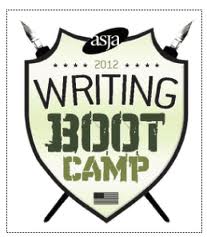To do good writing, read good writing. Here’s the good writing I’ve been reading this week:
 The annual American Society of Journalists and Authors writers conference is taking place right now in New York. I went last year to give a presentation and meet fellow writers and editors. I was invited back this year but had to drop out when work got so busy I couldn’t afford the time away. But I’m still planning to follow along via Twitter. I suggest you do too.
The annual American Society of Journalists and Authors writers conference is taking place right now in New York. I went last year to give a presentation and meet fellow writers and editors. I was invited back this year but had to drop out when work got so busy I couldn’t afford the time away. But I’m still planning to follow along via Twitter. I suggest you do too.
Here’s how to use Twitter and TweetChat to learn what’s happening at ASJA:
- Log onto your Twitter account.
- Open a new tab in your browser and log onto TweetChat, an app that lets you track Twitter conversations by hashtag, and if you want to join in, automatically adds the appropriatehashtag to your tweets. To log on to TweetChat, you have to give the application permission to access your Twitter account – do this or you won’t be able to see the ASJA tweets.
- Once you’re logged on, enter “ASJA2012” in the search box at the top of TweetChat’s front page – that’s the official hashtag that ASJA is using for tweets related to the writers conference – and click on “Go.” TweetChat will automatically switch to a screen that shows you all of the #ASJA2012 tweets as they’re happening.
- To ask someone a question or tweet something that everyone else monitoring the #ASJA2012 hashtag will see, type into the “Message to #asja2012” box at the top of the screen. Because TweetChat automatically adds the appropriate hashtag to your tweet, you’re message will need to be slightly less than 140 characters.
- Wait a few seconds and your message will pop up in the #ASJA2012 tweet stream.
- You can also use TweetChat to reply to or retweet someone else following the hashtag. You can also use it to favorite a tweet or look up the Twitter profile of someone who’s participating in the conversation.
- Keep TweetChat open in your browser for as long as you’re interested in tracking the action.
Other interesting links for writers:
15 newsroom tools from CIR’s TechRacking conference (10,000 Words) – Google recently sponsored a day-long conference for 200 news types where, according to the 10,000 Words blog, one of the common themes was, ” If we have to do more with less, then technology has to make up the difference.” Some of those tools are mentioned in this post, including Wavii, an instant news feed that lets you follow topics you might be writing about, and SpeakerText, a tool that works with the SoundCloud API and transcribes audio (goodbye transcription service).
Data Journalism Handbook – Speaking of hacks and hackers, this handbook was created during a 48-hour workshop in London in 2011 and was subsequently added to by major U.K. and U.S. news organizations. Use the website to add yourself to a list to be notified when the free web version of the book is out; an O’Reilly version is also coming soon.
75 ‘Write for Us’ pages (Freelance Writing Jobs) – Jackpot. The popular freelance blog made the hard work of looking for work a little easier by assembling this list of print and online markets for freelancers. Some listings include rates – and truth be told, many of them them are pretty low. [[UPDATED @ 2:30 p.m. Friday, 4/27 – It’s now been brought to my attention that this post is from 2010, a major fact I overlooked when I read through the information after seeing a link to it on Twitter earlier this week. I’m leaving it up, but be warned, the info is now pretty old.]]
How tech’s giants want to reinvent journalism (PaidContent) – Current thinking on how news is and could be, from representatives of Google and Facebook.
Economics 101 (BizJournalism.com) – Online course on economics for freelancers and other journalists interested in reporting on business or brushing up on their skills. June 26-28 for an hour a day.
The list from Freelance Writing Jobs is 2 years old.
Good catch! This is why it’s not always a good idea to write blog posts before 6 a.m. In my race to get this written and online before starting my “real” work day, I neglected to check that the post – which someone shared on Twitter this week – was new. Mea culpa. I will make a note indicating the original pub date on the item. Thanks for bringing it to my attention.
Michelle
I looked over the “15 Newsroom Tools” and went as far as subscribing to Wavii to discover it only offers preselected subjects, mostly celebreties, politicians and companies, nothing topical. There is no search function. It streams through your Facebook feed, another negative, because I only go there when I want to be distracted by my friends. So I immediately removed the app. I’ll stick with Google Reader.
On the other hand, I think I am in love with LiveScribe and the SmartPen. This looks like a valuable tool for researching, especially conducting interviews. You can make a few brief notes while the pen records an entire audio session. Just point to a place in your notes and the pen replays the associated section. You hardly need to transcribe. The reviews indicate it is better than iPad for this kind of function. I’d like to hear comments or criticism from anyone who has used a digitial pen.
Thanks for sharing your feedback about both of those tools – good to know.
Michelle